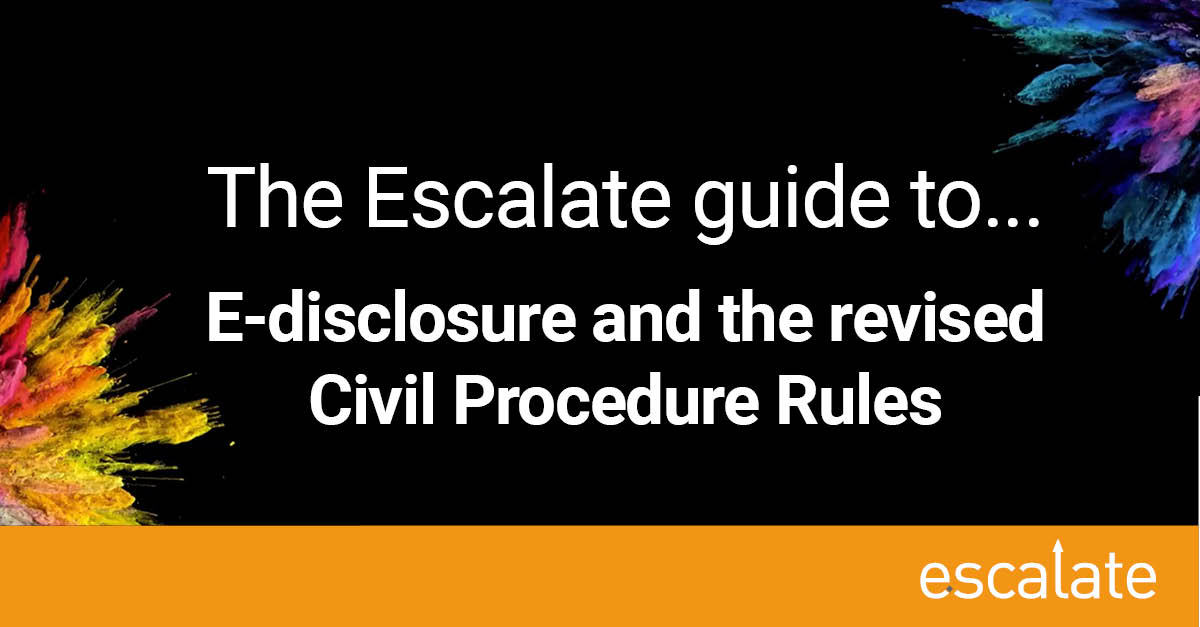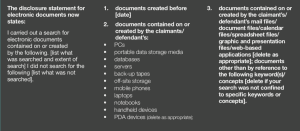Simply put, e-disclosure (or electronic disclosure) is the disclosure of electronically stored information. Disclosure is one of the stages in litigation when documents are considered in detail, and is an important stage in a dispute.
During recent years, electronic communications have transformed the way that business is done. Even before the advances of email and electronic documents were a factor, disclosure was one of the most expensive and time-consuming phases of litigation.
The growth in email usage, coupled with the fact that electronic documents are rarely lost forever, has created a challenge for anyone involved in a dispute which goes to litigation.
Now, the Civil Procedure Rules (CPR) have been revised to take account of the difficulties created by electronic documents. This new approach in itself poses questions for litigators and their clients alike.
What are the challenges with e-disclosure?
The pool of documents readily (or potentially) available for litigators to review, and then exchange with opponents is now significantly larger than it was even five years ago.
Since judges decide most cases on the basis of oral factual evidence, expert evidence, or documents, litigators have traditionally wanted to read every document that their client considers relevant.
Not only is this process part of seeking to obtain the best result for the client – it is also a part of a litigant’s obligation to disclose documents (those to be relied on and those that will help or hinder any party) to be listed and exchanged.
How are the issues being managed?
The original CPR, introduced in 1999, made no specific reference to electronic documents and also gave parties the ability to limit where they search for documents – typically by date (setting a backstop), physical location, and only searching for certain categories of documents.
However, these restrictions do not sit well with electronic documents, which can be searched for with varying degrees of ease and which may be found in a variety of different locations.
As a result, the rules setting out the way in which parties must disclose how they searched for electronic documents have been changed. The ‘disclosure statement’ has now been enhanced to show just how far it is possible to search for electronic documents.
Clarifying the definition of a ‘document’
- The new rules confirm that a ‘document’ includes e-mails and databases.
- It also clarifies that it is not limited to readily accessible documents, but also those stored on servers and back-up systems as well as ‘deleted’ documents.
- Usefully, it states that the meaning of ‘document’ includes metadata – information about the document stored in electronic format, such as the last saved date, which is not available on the hard copy.
- The revised CPR requires the parties to discuss issues that may arise concerning searches for, and preservation of, electronic documents, and suggest that in case of difficulty or disagreement the matter should be referred to a judge for directions at the earliest practical date.
- The rules also provide that the parties should co-operate as to the format in which electronic documents are going to be exchanged.
The updated rules then go on to set out the factors that a party may rely on in deciding how far to search for electronic documents. These factors include accessibility, location, likelihood of success in the search, cost and significance.
The importance of keywords in e-disclosure
In some cases, it may be reasonable to search using keywords, to help speed up the process of reviewing documents.
With large electronic disclosure exercises, searching using keywords is an obvious route to limiting the scale of the physical search for relevant documents, and avoiding reading every one. It is important to keep a record of what keyword searches were done.
New technology allows far more than simply searching for exact matches with words or phrases. ‘Conceptual searching’ for matching linguistic patterns may mean that search results can be grouped into categories of documents which are concerned with the same subject matter, even if the same words are not used in them.
What does this mean for you?
Even a cursory glance over the new disclosure statement shows that it is not a document that can be signed without some considerable thought.
Since the individual responsible for signing it is unlikely to be the person who has searched for the electronic documents personally, there clearly needs to be careful co-operation and clear auditable lines of reporting within organisations. In addition, issues arise from the bigger picture of how businesses deal with electronic documents in the long-term.
As the new CPR makes clear, even deleted documents are documents for the purposes of disclosure.
While the law does not set any specific obligation to retain documents for use in potential future civil litigation, companies are required to preserve them for at least six years by the Taxes Management Act 1970.
Managing your e-disclosure obligations
Download our official PDF for guidance on e-disclosure and the revised CPR rules, which includes a complete checklist of what you can do to manage and keep on top of the e-disclosure process. It also contains an extended version of the information in this article.
Escalate has extensive experience with the handling of e-disclosure during litigation proceedings, and a successful track record in recovering millions for SMEs involved in commercial disputes. The complete collection of ‘Escalate Guides to dispute resolution’ PDFs are available to view and download here.
If you’d like to get in touch with one of the Escalate team to discuss a commercial dispute, please contact us on 0207 039 1950 or email us.
< News & Views
CONTACT US
Contact Us to find out more about how Escalate can help your business.
Exchange Station, Tithebarn Street, Liverpool,
L2 2QP (Registered office)
London office: 5th floor, 15 Westferry Circus, London, E14 4HD
Escalate Law Limited
Company No: 10381993
Authorised and regulated by the Solicitors Regulation Authority
Escalate Law Limited (No: 650666)


